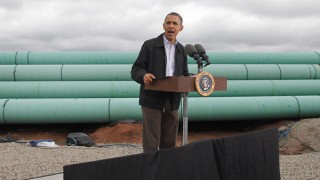
The United States Senate passed legislation on Thursday, approving the Keystone XL oil pipeline. Due to the passage, an impending veto face-off is expected to begin by President Obama. Legislation ended up passing by a 62-36 vote, after lawmakers had taken weeks making allowances for amendments.
The U.S. House ended up passing a comparable bill previously this month, even though there are minor differences that will need to be ironed out before the bill is able to head to Obama’s desk. Nevertheless, the vote marked the very first time the Senate agreed to approve the debated oil pipeline that would run from Canada to Texas, reports Fox News. Nine Democrats decided to join up with 53 Republicans in order to pass the measure.
Senate Majority Leader Mitch McConnell, R-Ky., commented before the vote, saying that by building the pipeline it would end up putting billions of dollars into America’s economy. It would also bring thousands of jobs and as State Department had previously shared, it would be able to do this with negligible impact on the environment.
Russ Girling, who is the CEO behind the project, said on Thursday, his company was encouraged by the sturdy bipartisan that had shown up in the Senate. However, Republicans are still lacking the votes they need in the 100-member chamber to override a presidential veto if it were to occur. When questioned about the bill, the White House Press Secretary Josh Earnest recapped that Obama definitely had plans to veto.
It is unclear at this time if the majority Republicans would be able to gather additional support in order to override the president’s planned veto. Since they took over the Senate this month, Republicans have made the Keystone pipeline their utmost priority on the heels of large wins from the November elections.
The Senate vote topped many weeks of debate that were considered chaotic and even at one time had the Senate in session into the early morning hours. Dozens of add-ons to the bill were deliberated on, but just a few, such as getting the Senate on record admitting that climate change was not some sort of hoax, made it into the bill.
McConnell exclaimed that the past couple of weeks had been a whirlwind, but that the pipeline jobs debate had been extremely important for the Senate and for the United States. He added that the Keystone structure project had been endlessly studied, from just about every angle possible, and the same overall conclusion keep becoming clear and that it was indeed to build the pipeline.
The bill would authorize construction of the nearly 1,180 mile pipeline, which would carry oil from Canada to Nebraska, where it would then connect with an existing pipeline and flow to the Gulf Coast.
The bill was first projected in 2008 and has been plagued by interruptions in Nebraska over its route and at the White House, where President Obama has continually resisted efforts by Congress into forcing him to make a decision. In 2012, the president rejected the plan after Congress attached a measure about a payroll tax cut extension which presented him with a deadline in making a decision. The pipeline’s contractor, TransCanada Corporation, then applied again.
Environmental groups have been calling on the president to continue to reject the project out-and-out, because it would allow energy companies to be able to tap an unclean energy source which could worsen global warming. The State Department’s investigation, supposing greater oil prices, discovered that shipping it by pipelines to tankers or rail could be worse for the Earth.
Yet, supporters said the pipeline is a much needed piece of infrastructure that would create thousands of jobs during its construction and increase energy security by bringing in oil from a welcomed and friendly neighbor.
